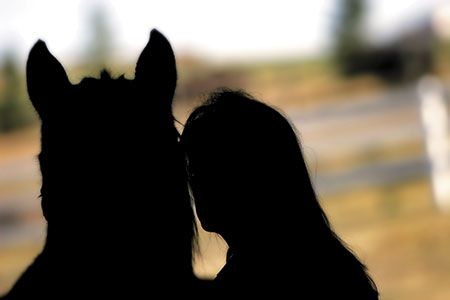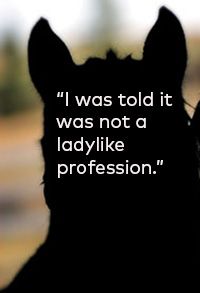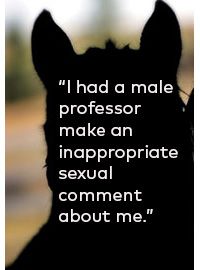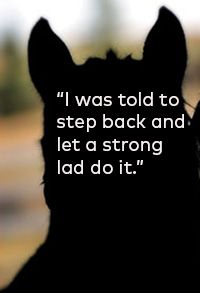Dont call her lady doc and other equine DVM horror stories
Female equine veterinarians share their gender discrimination experiences from vet school and beyond.

shutterstock.com
“Doctor of veterinary medicine.” It's a gender-neutral term, but when you read the words, an image begins to form in your brain. Add the word “equine” in front of “DVM.” What does your picture look like? Do you see roper jeans and a plaid shirt, or does your mind go to scrubs or a white jacket? Do you add a cowboy hat, sneakers or work boots? And does your mind's eye paint the image of a man or a woman?
Gender is a tricky issue. While it has nothing to do with how well you suture a nasty wound rent open by barbed wire or how quickly you can identify a lameness issue, not everyone seems to recognize that-especially when it comes to your clients.
We asked 77 equine veterinary professionals (75 DVMs and two equine vet techs) about their experiences as women working in large animal medicine. Here are some of their stories from veterinary school and life in private practice.
Getting into vet school
Even before women enter equine medicine, many have been “warned off” the path or encouraged to work in small animal medicine instead. Some common themes? They're told they're too small or weak; they'll lose interest once they marry and have children; they'll be stealing a job from a man. About 39 percent of respondents said they were discouraged from practicing equine medicine because of their gender. Here they share some of their stories:

“[I was told it was] not a ladylike profession.”
“During an interview to be accepted into veterinary school, I was asked how my boyfriend felt about me applying to vet school and how long I would practice before starting a family.”
“I was told by an older male veterinarian that I shouldn't bother going to vet school because I was just ‘going to get pregnant and leave the profession anyway.'”
“I was told flat-out that I would have kids and move into small animal, and it wasn't fair for me to be a vet or practice equine and limit the field in the future.”
“I was told by veterinarians growing up that I'd be better off practicing on small animals and owning horses. I was told by my internship advisor that women didn't want to work that hard or stay up all night with colics, especially once we had kids.”
In school
Forty-seven percent of respondents said they'd been treated differently by an instructor or peer because of their gender. When dvm360 asked respondents what they would change about veterinary school to promote equality, many suggested more women in director roles in large animal, surgery and orthopedic medicine. “Try promoting more women to leadership roles in veterinary schools. Where I am now we are more than 60 percent of the academics, but there is not a single female full professor,” writes one respondent.
“I experienced this in clinics and my externship and internship. Men who practice equine are put on a pedestal by other male veterinarians as well as support staff and clients. Even some female veterinarians do it too.”
“The equine department at my university was such a boys club. I was ignored, talked down to and dismissed the entire time.”
“The equine section head stated that women don't last in equine medicine, they shouldn't be surgeons, and the ones who do make it are single and childless. The men were given priority over women on surgical and challenging cases, even if the men were not interested in equine medicine. It was always assumed that my male resident mate was the better horseman, even when he would state I was better suited to handle a difficult patient.”
“In my class, the male students were given opportunities to practice procedures and attend extracurricular opportunities, such as castration and dental clinics, before female students. As a woman, I had to fight for opportunities that were more readily given to my male counterparts.”
“During food animal (bovine) rotations, the clinicians would say that many ‘girls' were not strong enough to do many of the tasks. I was a 41-year-old woman, so I was put off by the statement on many levels.”
“My male intern mate was constantly invited on fishing and golfing outings with the male practice owners. Myself and female intern mates were left to cover the clinic.”
“We need more female large animal instructors. My instructors in equine/large animal were all male on the clinic floor. One lecturing professor was female, but her current role did not allow her to be on the clinic floor. So it was a male-dominated clinic, and in my school, more male students on the large animal rotations. If you were a female on those rotations, you had to fight for cases and experience, which in turn made you look like a b**ch.”
“There was a disparity in the number of male students versus female students offered positions in certain wet labs and trips. The class demographic was 80 percent female. Wet labs organized by a specific faculty member would often be about 60 percent male and based off ‘personality.'”
“I'm a resident, and I get constantly shat on by my male seniors when I work harder and longer than my male counterparts. The male residents get invited to dinners, out hunting, to card games and get more one-on-one training and opportunities than I do. … No matter how hard I work, I'll never be good enough because I'm not a man. I regret going into my field.”

Other respondents suggested removing tenured faculty who showed gender bias and wished their schools had a more open attitude when students complained about inappropriate conduct, with more consequences for the perpetrators. Consider these examples they shared:
“I had a male professor make an inappropriate sexual comment about me.”
“I had a male professor engage in ‘flirtatious' behavior with me in a small group setting. When I asked him to stop this behavior (inadvertently bringing the attention of the entire group on us) he stopped for a minute or two before continuing. This particular professor made inappropriate jokes in anatomy lab to other classmates as well. I brought this to the attention of the vet school hierarchy and he was given a slap on the wrist and had to apologize to me, which he only half did-he explained that I was being quiet and he was trying to engage me in the group. I attempted to avoid interactions with him, which was difficult because he was my small group leader for the entirety of my first year of vet school. Luckily, he took a job elsewhere and left the school about a year later.”
Applying for jobs
Once they've run the gauntlet of vet school, many female equine veterinarians report that their challenges as women in a profession once dominated by males has just begun. Many shared stories of being offered lower pay than their male counterparts.
“[I was told that] they would never hire a young woman and certainly never consider making her partner, as once they had kids it meant they'd lose interest in their job.”
“I know my boss would have paid more for a male vet straight out of school than he would for me with a one-year internship under my belt.”
“I was passed over for ownership considerations, not because I don't meet all the criteria but because they assumed I wouldn't be interested.”
In practice
Ninety percent of the female equine veterinarians who took our survey said they've been treated differently by clients because of their gender. Many reported comments about their size, gender and strength.

“I've been told I'm not strong enough (I'm a weightlifter).”
“A vet I worked for as a summer student said it would be very hard to be a good equine vet as a small woman and encouraged me to consider other options.”
“There's a bias against women using size and strength, comments that hiring women is a risk because they have babies and then don't want to work. Lots of mansplaining. Every day. About almost everything.”
“I was told to step back and let a strong lad do it.”
Some clients are candid about preferring a male veterinarian, and others use the opportunity to make unwanted advances.
“I've dealt with not being referred to as doctor [by clients], or comments about what a shame it is that men aren't taking more roles in equine medicine anymore.”
“There are some clients in the practice who refuse to see me because I am a woman. Others like to see me but then make unwanted romantic advances.”
“Usually [when clients say something inappropriate] I retort with a smug comment, making them equally uncomfortable. For example, sheath cleaning jokes I answer with, ‘I only work with dicks longer then 12 inches.'”
“I've had clients who have requested me for being female-‘I don't want no man hands violating my mare'-and clients who expressed that naturally the only thing I was good at would be reproduction because as a female that would be ‘easily understood.'”
“A client told me outright that she would prefer a man to do her work before I had even introduced myself.”
“I'm in academia, and while it's hard to say with authority that I've been treated differently by coworkers, there are many instances where it seems to be the case. Certain receptionists will gladly help a male vet or just do what they ask but then argue with a female vet and not offer to help women with even secretarial-type duties. Additionally, female faculty seem to be criticized more sharply than their male counterparts, who are equally outspoken.”
“Clients take instruction and advice more seriously from males. My vet tech/assistant is my husband. Clients always assume he's the vet and direct questions to him.”

“My former workplace now has a harassment and bullying policy all employees must sign. No consequences for perpetrators, though.”
“Male clients in Texas frequently asked me when the ‘real doctor' was coming. They would refer to me by my first name but all male colleagues by ‘doctor.'”
“I have had countless disgusting experiences, from people who outright say, ‘I simply prefer men' or ‘Should I call the male vet in town to get my down 1,300-pound warmblood up, because you aren't strong enough?' to creepy men who call me a ‘good girl' and feel it is appropriate to repeatedly comment on the appearance of my backside when I am crouching.”
“I've been asked if I was a nurse, even when wearing a jacket saying ‘surgeon.' It's been presumed I was the junior vet and [the client] refused to [let me] do a procedure but they would allow the male intern-who then had to ask for my help-ha ha!”
“I get called ‘honey' or ‘sweetie' sometimes. I drive a truck for work daily and very often get asked if I want the client (if male) or the client's husband to back up my trailer for me. They will also ask if I want their husband's help if I have to change my propane tank heater or work on a piece of my equipment in my trailer.”
On the other hand, some women have found ways to change the opinions of their gender-biased clients-and even build relationships after an initial stumble.
“I had an older client at 2 a.m. with a dystocia ask if one of the men doctors was available instead, because he'd recently had a heart attack so he wouldn't be able to help. I replied, ‘Well, I'm seven months pregnant, so have you got anyone you could call to give us a hand?' He called two of his sons, we had a good outcome, and he was my biggest fan after that.”
“Greatest story ever: A client is very put off as he has to deal with me, a new young female vet. He lectures me about how another female vet ruined his friend's marriage by having an affair with the friend. Keep in mind my bosses were notorious for straying from the marital bed. I take one look at him and his balding head, paunch and lack of youth and say clearly, ‘You don't have to worry about that with me.' I am thinking, ‘Gag me if I ever want to sleep with that guy' and he is thinking, ‘What a nice, upstanding young vet.' I left the practice a few years later, and he went with me, and we became great friends.”
Do you have a story about gender issues to share? Email us at dvmnews@ubm.com.
Newsletter
From exam room tips to practice management insights, get trusted veterinary news delivered straight to your inbox—subscribe to dvm360.